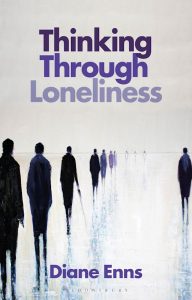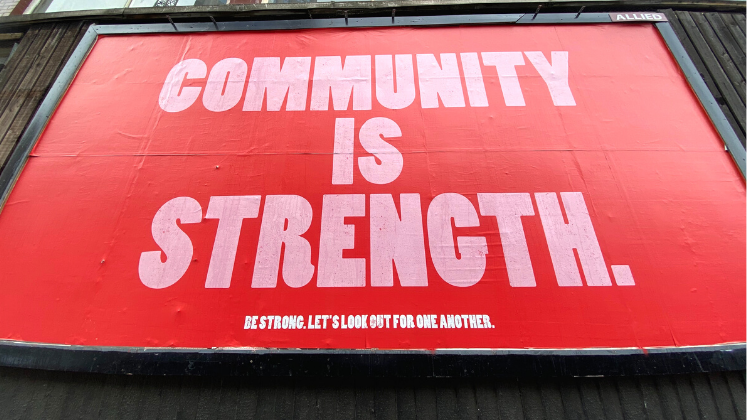13-17 June 2022 is Loneliness Awareness Week in the UK. We speak to Professor Diane Enns about her new book, Thinking Through Loneliness, touching on topics such as the need to consider the social structures that produce loneliness, the importance of weaving personal experiences into scholarly discussions of loneliness and how COVID-19 impacted the writing of the work.
Q&A with Professor Diane Enns on Thinking Through Loneliness. Bloomsbury. 2022.
 Q: What drew you to ‘thinking through loneliness’ in your new book?
Q: What drew you to ‘thinking through loneliness’ in your new book?
Quite simply, I wanted to understand my own experience of loneliness, which has been intense at various times in my life. I structure the book around these periods, marked by significant events such as losing my place within a close-knit community, becoming a single mother, leaving an intimate partner, living alone and experiencing an alienating workplace. My intent was to articulate precisely what I feel when I’m lonely, to define the experience and explore what this unique form of suffering tells us about social needs and what happens when these needs are not met. This led me to some extensive reading on the subject, including both personal accounts and scholarly investigations. While I found the personal narratives fascinating, the scholarly discussions were for the most part unsatisfying. I was particularly struck by the tendency among scholars and pundits alike to individualise loneliness: there is little attention to the social structures that produce loneliness at the collective level.
Q: You take care to distinguish loneliness from potentially related experiences like solitude, aloneness and alienation. How would you define loneliness?
I define loneliness as an unfulfilled desire for intimacy or closeness to others. We could call it a craving or a hunger. In the book I make an analogy with a starving body that has to draw energy from its own muscle and fat stores to survive because nourishment is unavailable. I don’t think this analogy is too dramatic — those who suffer from loneliness may feel an intense psychological emptiness and yearning for intimacy. When I say ‘intimacy’, I mean this in a broader sense than what we typically mean by that term: we all need companionship, care, love, to be understood and valued, and to feel we are a cherished part of our small corner of the world.
My definition of loneliness is not original. Frieda Fromm-Reichmann, a twentieth-century psychiatrist, and others before her, wrote of loneliness as a craving for intimacy. But I expand our understanding of loneliness to include our need to belong not only to friends, family or our most intimate others, but to a world. In this respect, I’m informed by the work of Hannah Arendt, whose entire corpus emphasises the absolute necessity of belonging to a public space in which we share the burden and joys of collective life. Loneliness is the effect of being deprived of a shared world.
Q: What do we gain when we consider this role of the social in experiences of loneliness?
I find it really remarkable that much of the scholarly and popular literature on loneliness reduces the experience to a personal matter, which inevitably means the lonely person is responsible for overcoming their loneliness. This implies that the causes of their loneliness are also personal. The presumption is that there is something wrong with you if you are lonely: you are too shy, or annoying, or self-pitying, and so on. Appropriate solutions must be found by the lonely themselves: get more proactive in meeting people — join a hiking club, a pottery class, a dating site — or work on your personal flaws or social phobias through therapy and self-discipline. Much of what is written about loneliness doesn’t seem to be written by — or for — the lonely.
When we realise that loneliness is a symptom of social failure, it not only loses its stigma but also shifts the responsibility for alleviating loneliness from the individual to the collective. Loneliness as a mass experience became a public concern even before the COVID-19 pandemic sent us all into isolation (which explains government initiatives like the UK’s Minister for Loneliness). But it is rare for public discussions to expose the deeper conditions of contemporary loneliness, rooted in a hyperactive technologised version of capitalism that commodifies and instrumentalises our relationships, traps us in work schedules that leave no time for friends and pits everyone against each other in the fierce competition for a financially secure future. We can’t understand loneliness in the 21st century without recognising the structures currently responsible for eroding the foundations of human social life — foundations supported by such everyday acts as common courtesy, care, kindness, tolerance, open communication and empathy.

Image Credit: Photo by – – on Unsplash
Q: Why is there a stigma attached to loneliness? Given the shame that can surround loneliness, how important was it to weave your own personal experiences into the book?
There are a number of reasons for the stigma of loneliness, but perhaps the most important has to do with our fundamental vulnerability as human beings who must depend on one another for survival. None of us can live a decent life without care, companionship, love and a place to belong — these are powerful social needs that challenge what seems to be a historically constant desire for human ‘sovereignty’ and invulnerability. We could go one step further and relate this desire to an intense anxiety over our mortality. The lonely person reminds us of our vulnerability and provokes an anxiety about being alone, which is perhaps also a fear of death.
But the stigma surrounding loneliness also has to do with the perception that a lonely person is unloved and therefore unlovable, which returns us to the personalisation of loneliness and to cultural prescriptions for an optimal social life. For example, though the nuclear family is no longer the norm and solo living is on the rise, being single can cause loneliness because we still idealise coupledom and family life. This leads to stigmatising the single person, which inevitably renders them responsible for their loneliness.
The public attention to loneliness resulting from pandemic-induced isolation has helped to curb the stigma and reduce the shame, which proves these arise only when we consider loneliness a symptom of personal failure. When we recognise that loneliness is produced by social failure, it loses its stigma.
As for why I reflect on my own personal experiences of loneliness, the short answer is, I couldn’t do otherwise. It is unusual for an academic philosopher to include reflections on the experiences that motivate a work, but I have always had trouble drawing a line between experience and ideas. If ideas and theories bloom from a description and analysis of what we experience, why leave out the experience when we elaborate the ideas? When writing about such a profoundly interior, yet shared, phenomenon as loneliness, the experience seems an essential part of the story. Perhaps my book was a small act of rebellion against the stigma. To make oneself vulnerable to readers is to accept and value vulnerability more generally. My own stories have their unique intonation, but I’m guessing they will resonate with at least a few readers.
Q: Thinking Through Loneliness also draws on artistic and literary works. How did working with these texts help you in thinking through loneliness?
I wouldn’t know how to discuss any intense experience of suffering without reference to artistic and literary works. To be moved by a work is as essential, in my view, as to be inspired or provoked intellectually. I was struck by the longing for intimacy conveyed in Toni Morrison’s novel Beloved decades ago on my first of many reads, which has stayed with me. And who can read Franz Kafka’s story ‘The Metamorphosis’ without shuddering over the terrifying alienation and loneliness of Gregor Samsa, understanding our own alienation through an encounter with his?
It would be difficult to analyse loneliness by referring exclusively to philosophical texts that engage with the subject, since there are so few. And in general, aside from Fromm-Reichmann’s 1959 essay, ‘Loneliness’, and a handful of other works, I found the social science literature to be rather too scholarly for understanding such a complex experience. Many of the categorisations of this or that type of loneliness landed too far from the original experience and as a result glossed over the vicissitudes of loneliness.
The most poignant descriptions of human experience always come from artists and writers. Given their intent is not to settle the rich complexity of an experience into something more systematised and palatable, we really must look to them for understanding.
Q: How did the COVID-19 pandemic affect the writing of Thinking Through Loneliness?
It is quite remarkable that I was writing the last part of my book — the part that focuses on social needs — when we were hit with our first lockdown here in Toronto in March 2020. Many of us may have already forgotten how we felt during the early days of the pandemic: fear and anxiety (and grief for those who lost loved ones), but also incomprehension and disbelief at the predictions this would last longer than a month or two. In the face of an unprecedented social crisis (normally, we can bear suffering only because we can bear it with others), I felt the entire book needed to be rewritten. The pandemic caused such a definitive break in time — we now say ‘pre-Covid’ or ‘post-Covid’ (though it is not over) — that everything I had written seemed suddenly out of date. No doubt a reader will notice the melancholy tone in the last part of my book, for I was mourning those small, beautiful moments of human sociality that I was missing so keenly at the time.
But the pandemic has simply exacerbated the conditions for loneliness that were already in place. It has forced us to realise that as a society we are not providing the best care for elderly people, single parents or the victims of domestic violence. Neither are we adequately dealing with economic inequality or structural racism and sexism. It has also thrown into stark relief the extreme contradictions of digital communication, which saved many of us from the worst isolation of a lockdown, yet accelerated its social harms and our growing indifference to them. These are deep social problems that affect whether or not we feel that very vital sense of belonging to the world.
Q: This week is Loneliness Awareness Week in the UK. Can initiatives like this help us in tackling the shame and stigma that still surround experiences of loneliness?
Current public discussions about loneliness and campaigns to address it are certainly helpful in removing the stigma associated with being lonely. However, I worry that all this public activity is not getting at the roots of contemporary loneliness. When these include meaningless work for masses of people, isolation caused by changes to family and community life, the erosion of care and the normalisation of anti-social behaviour fostered by digital forms of communication (hostility, sectarianism, misogyny, violence), we may understand why we focus on campaigns that promise change within our grasp. This is not to dismiss projects such as co-housing, men’s sheds, communal gardens or youth organisations (or a ‘Loneliness Awareness Week’), but these efforts can mask the deeper problems at stake. I think we need to recognise that our social existence must be fought for and protected, just as we would fight for democracy or human rights.
Note: This interview gives the views of the author, and not the position of the LSE Review of Books blog, or of the London School of Economics and Political Science. The interview was conducted by Dr Rosemary Deller, Managing Editor of the LSE Review of Books blog.
Banner image credit: Photo by Geoffroy Hauwen on Unsplash







